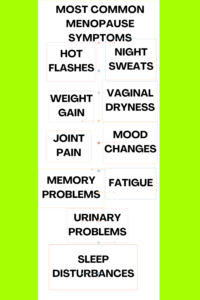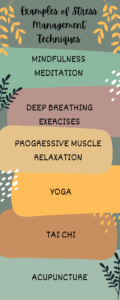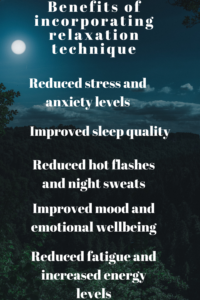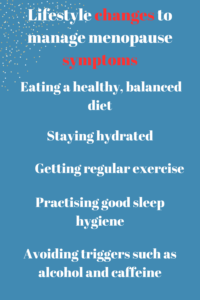Are you experiencing menopause symptoms that are disrupting your daily life? If so, you’re not alone. Menopause is a natural part of a woman’s life cycle, but the symptoms can be uncomfortable and challenging to manage. The good news is that there are many approaches to managing menopause, including relaxation techniques, that can help you unwind and thrive during this transitional period. In this blog post, we will explore some of the best relaxation techniques for managing menopause symptoms and the science behind how relaxation techniques can benefit your body and mind. Let’s dive in and learn how to embrace these benefits!
Understanding Menopause Symptoms
The end of a woman’s reproductive years is marked by the normal biological process called menopause. It is a normal part of aging and typically occurs between the ages of 45 and 55. During this transition, a woman’s body undergoes significant changes that can cause various physical and emotional symptoms. Understanding these symptoms is an essential first step in managing the condition.
A. Overview of the common menopause symptoms
Not every woman experiences all of these symptoms, and the intensity and duration of symptoms can vary from person to person.
B. How stress and anxiety can worsen symptoms
Because stress and worry raise cortisol levels in the body, they can exacerbate menopause symptoms. High cortisol levels can interfere with the body’s production of estrogen and progesterone, which can ultimately exacerbate menopause symptoms.
C. Importance of stress management
It is essential for women going through menopause to control their stress. Studies have shown that practicing relaxation techniques can help reduce stress levels in menopausal women, leading to improved overall health and well-being.
Finding the proper stress management technique is highly individualized, and it may take some experimentation to figure out what works best for you.
It’s also important to note that lifestyle factors such as diet and exercise play a significant role in managing menopause symptoms,
In conclusion, menopause is a natural stage of life for women and is associated with a variety of physical and emotional problems. Understanding these symptoms and how they are impacted by stress and anxiety is a critical first step in managing the condition. By practicing stress management techniques such as meditation and deep breathing exercises, women can reduce their stress levels and improve their overall health and well-being during this transitional period.
The Benefits of Relaxation Techniques for Menopause Symptoms
Menopause can present a unique set of challenges for those experiencing it, but employing relaxation techniques provides an avenue to mitigate those symptoms effectively. Let us explore how these techniques can aid in managing the physical and mental effects of menopause.
A. Overview of Relaxation Techniques and Their Functions
There are many various relaxation methods that can be used to suit different lives and tastes.They serve a dual purpose—they not only alleviate specific menopausal symptoms but also enhance overall well-being.
Benefits of Relaxation for Physical Symptoms:
Reduced frequency of hot flashes: Techniques like deep breathing can help to cool down the body’s sudden warmth.
Improved sleep quality: Practices such as meditation and yoga facilitate better sleep by calming the mind and relaxing the body.
Increased energy levels: Regular relaxation can combat fatigue by improving sleep and reducing stress.
Benefits of Relaxation for Emotional Symptoms:
Enhanced mood stability: Activities that promote relaxation can help regulate mood swings and emotional responses.
Decreased anxiety and stress: Strategies like progressive muscle relaxation target the physical manifestations of stress.
Cognitive benefits: Memory and concentration can be improved by engaging in focused relaxation activities.
B. The Connection between Relaxation and Menopause Symptoms Management
The physiological changes during menopause can disrupt the body’s natural equilibrium, making effective symptom management an essential aspect of care.
How Relaxation Aids Hormonal Balance:
Cortisol Reduction: Relaxation reduces cortisol, which can otherwise hurt hormone balance.
Endorphin Release: Many relaxation techniques increase endorphins, improving mood and pain tolerance.
Impact on the Autonomic Nervous System:
Sympathetic Nervous System: Relaxation techniques can decrease the activity of the sympathetic nervous system, reducing the stress response.
Parasympathetic Nervous System: These techniques encourage parasympathetic activity, promote a restful digestive state, and benefit healing and rejuvenation.
C. Scientific Studies that Validate Relaxation Techniques
A growing body of research demonstrates the positive impact of relaxation techniques on menopause symptoms.
Research Highlights:
Studies on Breathing Techniques: Research has shown that paced respiration can significantly reduce the frequency of hot flashes.
Meditation and Mindfulness: Studies suggest these practices not only lower stress but also mitigate menopausal symptoms such as night sweats.
Yoga’s Benefits: Clinical trials have found that yoga can help manage psychological and physical menopausal symptoms.
By exploring the benefits of relaxation techniques and understanding their role in managing menopause symptoms, individuals can take proactive steps toward improving their quality of life during this transition.
This section encompasses the positive effects of relaxation on menopause symptoms, discusses the interconnectedness of these techniques with symptom management, and references scientific studies to substantiate the claims.
Best Relaxation Techniques for Managing Menopause Symptoms
Navigating the waters of menopause can be smoother when equipped with effective relaxation techniques specifically tailored to address its varied symptoms. While some approaches may be familiar, diving into less commonly discussed techniques can uncover hidden gems of relief and comfort. Let’s unravel some of the best relaxation techniques that can manage menopause symptoms uniquely and effectively.
Innovative Approaches to The Best Relaxation Techniques for Managing Menopause Symptoms
Nature Therapy (Ecotherapy)
Spending time in nature, a practice often called forest bathing or ecotherapy offers a unique form of relaxation. The tranquil setting of a forest or garden can help reduce blood pressure, which usually spikes during stressful periods associated with menopause. The sensory experience of connecting with the earth and its natural rhythms also promotes hormonal balance and emotional grounding. These restorative natural environments can be a sanctuary for menopausal women seeking peace and hormonal harmony.
Aromatherapy with Lesser-Known Essential Oils
While lavender and chamomile are widely recognized for their calming properties, exploring less commonly used essential oils might offer new benefits. For instance, Clary Sage is known for diminishing hot flashes and improving clarity of mind. Neroli oil, extracted from the blossom of the bitter orange tree, has shown promise in reducing menopause-related anxiety and improving estrogen levels.
Sound Healing and Binaural Beats
Sound healing, particularly binaural beats, is a fascinating modality that promotes relaxation and sleep. By listening to sounds at specific frequencies, it’s possible to encourage the brain into a state of relaxation that mirrors meditation, which can be particularly useful for those who find traditional meditation practices challenging. These auditory stimuli can create a state of deep rest and facilitate night-time relief from insomnia and anxiety that often accompany menopause.
Hydrotherapy
Water has been used for centuries as a medium for relaxation and healing. Hydrotherapy, which involves using water at different temperatures, can relieve menopause symptoms. Warm baths are known for easing muscle tension and promoting sleep, while cold compresses may help reduce hot flashes. Incorporating magnesium salts into bathwater can augment these effects by aiding muscle relaxation and improving sleep patterns.
Biofeedback
Biofeedback is a technique that teaches control over certain physiological functions that are typically involuntary—like heart rate or muscle tension. Through biofeedback, women can learn to manage hot flashes and stress-related symptoms by gaining greater control over their body’s response to menopause symptoms. Though more technological, this method offers a unique approach that empowers women through self-awareness and bodily control.
Mindful Movement Practices
Mindful movement practices such as qigong, a form of gentle exercise rooted in Chinese medicine, offer a novel approach to relaxation. Unlike the more commonly discussed yoga, qigong emphasizes the smooth flow of energy throughout the body, which can help balance the body’s internal temperature and emotions.
You could also try this little-known secret, MenoRescue, a menopause supplement that promotes a calm and comfortable menopause.
Integrating unique relaxation techniques during menopause can offer fresh approaches to symptom management. It’s about finding the right combination that resonates with one’s body and lifestyle, providing a bespoke blueprint for navigating this natural phase of life with grace and ease.
Incorporating Relaxation Techniques into Your Daily Life
Now that you have learned about the benefits of relaxation techniques for managing menopause symptoms, it’s time to incorporate them into your daily routine. Here are some tips to help you get started:
1. Schedule time for relaxation: Make relaxation a priority by scheduling it into your daily routine.
2. Practice deep breathing: Deep breathing is a powerful relaxation technique that can help you reduce stress and anxiety. To do this, find a quiet place, sit comfortably, and take slow, deep breaths in through your nose and out through your mouth.
3. Try yoga or meditation: Yoga and meditation are great ways to relax your mind and body. Look for local classes or online tutorials to get started.
4. Take a warm bath: A warm bath can help relax and soothe sore muscles. Add some essential oils or Epsom salts to enhance the experience.
5. Listen to calming music: Calming music can help reduce stress and promote relaxation. Create a playlist of your favorite relaxing tunes and listen to it whenever you need to unwind.
6. Get a massage: A massage is a great way to relax your muscles and reduce tension. Look for a licensed massage therapist or invest in a massage chair for at-home use.
7. Practice mindfulness: Mindfulness is the practice of being present in the moment and fully engaged in what you are doing. Try to be mindful in your daily activities, such as eating, walking, or talking to others.
By incorporating these relaxation techniques into your daily routine, you can reduce menopause symptoms such as hot flashes, mood swings, and insomnia. Start small and gradually build up to more extended periods of relaxation time for maximum benefits.
Conclusion
In conclusion, relaxation techniques are an effective way to manage menopause symptoms and improve overall well-being. By incorporating relaxation techniques into your daily routine, you can experience the following benefits:
The best relaxation techniques for managing menopause symptoms include:
1. Deep breathing exercises
2. Yoga and stretching
3. Meditation
4. Tai chi
5. Progressive muscle relaxation
6. Aromatherapy
7. Massage therapy
It’s important to remember that everyone’s experience with menopause is unique, and what works for one person may not work for another. Finding the best relaxation techniques for you may take some trial and error, but the benefits are well worth the effort.
In addition to relaxation techniques, you can make other lifestyle changes to manage menopause symptoms. These include:
Implementing these relaxation techniques and lifestyle changes into your daily routine can help you manage the symptoms of menopause and improve your overall quality of life. Remember to be patient and kind to yourself during this transition, and don’t hesitate to contact your healthcare provider for additional support and guidance.
A. Menopause can be a challenging phase in a woman’s life, accompanied by a range of physical and emotional symptoms. Relaxation techniques such as deep breathing, meditation, and yoga can help manage these symptoms by reducing stress, anxiety, and irritability. They can also improve sleep quality, boost energy levels, and enhance overall well-being.
B. If you’re experiencing menopause symptoms, it’s time to prioritize self-care and incorporate relaxation techniques into your daily routine. You can start by setting aside just a few minutes daily to practice deep breathing or meditation. You can also try joining a yoga class or finding an online guided meditation.
C. Remember that taking care of yourself is essential during menopause. By implementing relaxation techniques into your everyday routine, you can control your symptoms and enhance your quality of life. Don’t be afraid to experiment with different techniques and find what works best for you. With a little effort and commitment, you can thrive during this critical phase of your life.
Embark on a journey to reduce your stress by adding this morning drink, MenoRescue, to your breakfast. I did, and I found a breakthrough with my menopause symptoms. I highly recommend it!
This website may contain affiliate links, and we may earn a commission for any purchases you make on affiliate websites using these links. Our affiliates include Clickbank. Rest assured, these affiliate links come at no additional cost to you.






